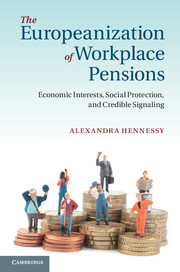 The Europeanization of Workplace Pensions
The Europeanization of Workplace Pensions Published online by Cambridge University Press: 18 December 2013
The privatization of public pension systems is commonly viewed as imperative to ease the strain on nations' fiscal resources. Yet, the overhaul of state pension systems is a high-risk political endeavor. Because privatization replaces the principle of public social insurance with individual responsibility for old age income, organized beneficiaries of state pension benefits will vehemently oppose reform. Structural pension reform is also perilous from a financial cost perspective. By channeling pension contributions away from public to private pension funds, the government accumulates a deficit to cover the current pension liabilities during the reform's transition period. Since the costs of pension reform accrue immediately but the long-term benefits – lower fiscal outlays – do not materialize until the distant future, it hardly surprising that governments pursuing such a strategy often suffer electoral defeat (Pierson, 2000b; Jacobs, 2011).
Given the high risks associated with the reform of state pension systems, it is puzzling to observe that this measure was adopted by so many European countries in the 1990s and early 2000s. During this period, several European governments have either privatized their pension systems or introduced funded components. Existing studies do not offer unequivocal conclusions about the causal pathway of reform because they concentrate on a single impetus instead of probing a variety of possible explanations. Works attributing pension reform to purely domestic pressures, such as rising longevity, low fertility, and concomitant financial exigencies (Taverne, 2001; Disney, 2003) cannot account for the timing of pension reforms.
To save this book to your Kindle, first ensure [email protected] is added to your Approved Personal Document E-mail List under your Personal Document Settings on the Manage Your Content and Devices page of your Amazon account. Then enter the ‘name’ part of your Kindle email address below. Find out more about saving to your Kindle.
Note you can select to save to either the @free.kindle.com or @kindle.com variations. ‘@free.kindle.com’ emails are free but can only be saved to your device when it is connected to wi-fi. ‘@kindle.com’ emails can be delivered even when you are not connected to wi-fi, but note that service fees apply.
Find out more about the Kindle Personal Document Service.
To save content items to your account, please confirm that you agree to abide by our usage policies. If this is the first time you use this feature, you will be asked to authorise Cambridge Core to connect with your account. Find out more about saving content to Dropbox.
To save content items to your account, please confirm that you agree to abide by our usage policies. If this is the first time you use this feature, you will be asked to authorise Cambridge Core to connect with your account. Find out more about saving content to Google Drive.